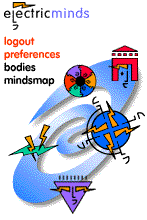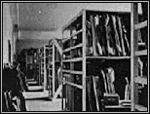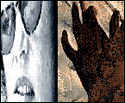
|

|
|
Stolen Treasures: New Revisions
mark jones (markj)It was one of Adolph Hitler's dreams to build a great art museum in Linz, Austria. From the very beginning of their reign, the Nazis proved vigilant in the pursuit and acquisition (i.e., the purchase or theft) of great works of art -- and if such works belonged to Jews, so much the easier was the job. During World War II, many of these works were stored in saltmine caverns near Linz, and when Germany's defeat seemed eminent, the Nazi commandant of the facility ordered the saltmines and artworks destroyed. Fortunately, workers conspired so that no wholesale destruction occurred, although the collection was not kept intact but dispersed throughout Europe and the world.
From her initial casual conversations with the group, Frenkel was able to map an artistic course for the piece. The Transit Bar was installed in Kassel, Germany; by the time Frenkel's installation returned to Toronto in 1994 for an exhibition at the Power Plant, the idea of a virtual Transit Bar on the World Wide Web had started to make sense as a way of furthering the efforts of other artists interested in investigating the possible whereabouts of the lost art. So was born Body Missing, the Transit Bar's Internet extension, aimed at investigating the events surrounding the planned Hitler Museum and the effort to find the lost works of art. Frenkel explains: "It really felt as if the Web had been invented just to suit my way of thinking and seeing and working, allowing me the level of complexity and the mix of knowns and unknowns that the project required." With the help of Toronto website designers James Allan in Montreal and Steev Morgan, and with advice from York University webmaster Rod Potter, a prototype was eventually churned out in time for the International Symposium of Electronic Art '95, held in Montreal in September. (Other key programmers include Guenther Gessaert in Linz, Austria; and Laura Padgett in Weimar, Germany.) Though one main purpose of Body Missing was firmly rooted in the very real search for the lost art, the site is designed to blur the distinction between fact and fiction. At times, wandering through this intricate website feels like playing Myst -- occasionally one stumbles over a newspaper clipping, or an artist's note about a recent finding. This, says Frenkel, was very intentional: she wanted each person to invent his or her own path, and experience whatever highs and lows might be found along the very real road to discovering a true story: "The uncertainty regarding who's-telling-you-what keeps the questioning, and therefore the issues, alive. It really is a climate rather than a series of train tracks." The site has continued to evolve through regular updates by artists and/or contributors. After all this, what does Frenkel think of the web as an artistic medium? "Most of what I've seen isn't art. Information isn't art. Information isn't even meaning unless you know how to contextualize and receive it. I see lots of amplifications of existing cultural neuroses, from power-hunger to narcissism (that's predictable). But I'd really like to see works of art that connect with the net's time, space, and multidisciplinary implications. The net's an omnidimensional distorting mirror. But it's also a research tool, a sop for loneliness, a merchandising potential." Frenkel's greatest impatience with the net is not the preponderance of corporate design ("So many sites look like traditional annual reports"), but the designers' insistence on patronizing and overinstructing the viewer. An exploration of Body Missing won't leave you feeling patronized. I can guarantee that it will be instructive. But instructive of what? -- That's the mystery that such art might help each of us discover. |
windwalker said: I am once again a very small child exploring the paths through the Montana woods and find a place of total enchantment where there lived a very wise old man who taught me to talk to the fairies on their huge sunflower telephones and walk down a magic path to where the trout filled pond lay glistening in the sun. An old dead tree stump, carved with nitches here and there and a crow's nest sat atop it waiting for its owner to come cawing back, while I, in awe and wonder, saw a Fairy Post Office which held from time to time, a pack of Wrigleys Juicy Fruit gum, a string of pearls or a nail set to fix my nails. How I loved that gentle soul and often wished his tale be told. His name was Hawkins and the place was Absarokee, Montana Most Active Topics: Topic 31 What would you do if you & your love where the last people on the planet??? Topic 8 Who writes poems Topic 53 CHESS | |||
|
How much of the missing artwork of World War II has been recovered?
Says Frenkel: "It's a very grey area. There have been two major exhibitions of captured war 'trophies' in Russia, and one at the Musee d'Orsay in Paris. The Austrian recently handed a body of work over for public auction assisted by the Jewish Community in Vienna, with proceeds to go to charity." The Transit Bar and Body Missing are currently touring Scandinavia through June; Warsaw from June to August (Centre of Contemporary Art); Norway from September to November (Lillehammer Kunstmuseum), and then Finland (Ars Nova and Turku Art Museum).
Interested in contributing to the discussion in words or images, send a note to artworks@yorku.ca. | ||||
Also in Flash!: My E-Minds Story Stolen Treasures: New Revisions "Youth, Lightness, and Good Spirits": le Festival du Voyageur | ||||
|
|
|
electric minds |
virtual community center |
world wide jam |
edge tech |
tomorrow |
conversations
Any questions? We have answers.
©1996, 1997 electric minds, all rights reserved worldwide.
|


 Fast forward to Linz, 1992.
Vera Frenkel, a Canadian multimedia artist, exhibited her video
installation, "
Fast forward to Linz, 1992.
Vera Frenkel, a Canadian multimedia artist, exhibited her video
installation, "
